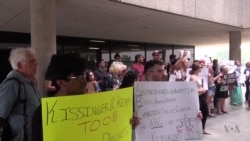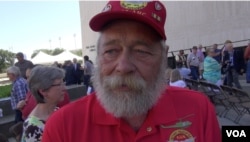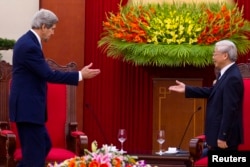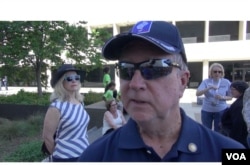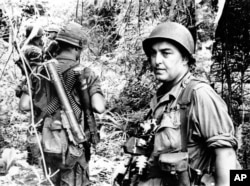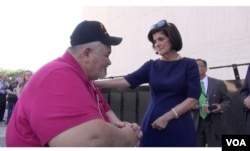U.S. Secretary of State John Kerry delivered an emotional keynote address at the Vietnam War Summit at the LBJ Presidential Library on the campus of the University of Texas in Austin.
Kerry, who served in Vietnam and later protested against the war, briefly choked up as he spoke of the terrible price paid by many of those who served in the conflict. He also noted the transformation in U.S.-Vietnam relations through trade ties and other areas of cooperation he said have made partners of the two former enemies.
WATCH: Video of veterans, Luci Baines Johnson
Kerry’s Vietnam veteran critics
Just as controversy over the war continues, however, Kerry’s participation in the event also was met with some controversy. Some Vietnam veterans took issue with his role in the event, deriding him as someone who had turned his back on the cause for which they fought in Vietnam, namely saving South Vietnam from communist invaders.
Some of Kerry’s critics were on hand for the Vietnam Summit and at a ceremony to honor the service of those who served in Vietnam held in the plaza outside the library. Edward Zielinski, who flew helicopters in Vietnam in 1969 and 1970, was upset by Kerry’s presence.
“I think it is a disgrace,” he said, “because I think he is a traitor, especially to Vietnam veterans.”
He is among the vets who felt betrayed by Kerry’s anti-war protests after he returned home from the war. Many of them also believe he used his military service, as well as his later dissent, to further his political ambitions.
Kerry’s veteran defenders
But other veterans disagreed. Thomas Goff, a retired U.S. Army lieutenant colonel who led combat patrols in Vietnam, said he has “immense respect” for Kerry.
“I also became anti-war,” he said. “It was a disaster for the U.S. military, a horrible disaster; it took us years to overcome that.”
Among other defenders of Kerry was former Secretary of State Henry Kissinger, who served under president Richard Nixon and carried out peace talks with the North Vietnamese that led to a peace accord. He said he remembered when he was in the White House and Kerry was outside leading protests. Yet, he said, he and Kerry had become good friends and were joined in a mutual respect for each other.
Both Kissinger and Kerry were the targets of about three dozen protesters who chanted and waved signs outside the LBJ Library Tuesday. They accused Kissinger of helping to carry out an illegal war in Vietnam and condemned Kerry for his part in U.S. policies that involve intervention in the Middle East and elsewhere.
In a further link with the Vietnam War that added a note of somewhat morbid nostalgia to the occasion, the mostly young protesters chanted “Hey, hey, LBJ, how many kids did you kill today,” which commonly was used by protesters outside the White House during President Lyndon Johnson’s last few years in office.
Kerry discusses lessons of Vietnam War
In comments made in an on-stage conversation with documentary filmmaker Ken Burns, Kerry spoke of the lingering anger of many people who have not yet come to terms with the war.
“Some people have frozen in place,” he said, “and they are not going to be able to change and that is too bad.”
Kerry welcomed the widespread honor Americans now bestow on those who serve in the military, something he said was sadly lacking during the divisive Vietnam war years.
He said there is what he termed “a dangerous separation,” though, between Americans who fight for the country and the majority of people who have no connection with the armed forces. He said every U.S. citizen should perform some service for the country, even if it is not in the military.
The U.S. secretary of state said the most important lesson the United States should take from its Vietnam experience is the need to see the world from the perspective of people in other nations.
“We should put ourselves in other people’s shoes and see their country as they see it,” he said, adding that if Americans do that “we will do a lot better.”
The Vietnam War Summit continues through Thursday, with perspectives offered by Vietnam era anti-war folk and rock singers, a discussion by veterans of how the war looked from the front lines and an address by Vietnam’s ambassador to the United States, Pham Quang Vinh.





